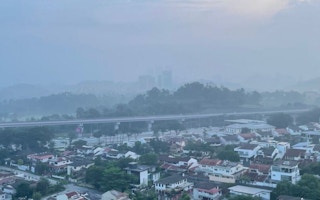As toxic smoke from burning peatlands billows across Southeast Asia, environmental campaign group Greenpeace has called on the region’s governments to introduce domestic laws to combat transboundary air pollution so that companies linked to the fires are held to account.
Over the past week, poor air quality has been recorded in Malaysia, Indonesia, Singapore and parts of Thailand, with slash-and-burn forestry by smallholder farmers and the presence of agribusinesses operating on drained peatlands the most commonly cited causes of the smog.
Greenpeace said in a statement on Tuesday that Southeast Asian governments should enact domestic transboundary haze pollution legislation as a deterrent to companies responsible for the haze.
To continue reading, just sign up – it’s free!
- Get the latest news, jobs, events and more with our Weekly Newsletter delivered to you free.
- Access the largest repository of news and views on sustainability topics.
- You can publish your jobs, events, press releases and research reports here too!
Newsletter subscribers do not necessarily have a website account. Please sign up for free to continue reading!
The Transboundary Haze Pollution Act was first enacted by Singapore in 2014. It was used by Singapore’s environment agency to sue Indonesian paper company Asia Pulp & Paper and a group of smaller firms in 2015 after one of the most severe periods of haze ever recorded. The agency’s case against APP is still pending.
Malaysia had planned to introduce a cross-territory haze bill in 2019, but this was shelved after a change in government. Malaysia’s environment minister said in June that plans for a transboundary haze act are still under review.
“Enacting a domestic Transboundary Haze Act is necessary to act as a deterrent, especially as there are bad apples in the industry. It can provide legal grounds for each country to institutionalise checks and balances to ensure their own companies operate responsibly,” said Heng Kiah Chun, regional campaign strategist, Greenpeace Southeast Asia.
A diplomatic row broke out between Malaysia and Indonesia over the origin of the smog on Saturday, when Indonesia’s environment minister balked at a claim from her Malaysian counterpart that smoggy air in Sarawak had drifted over from its neighbour, where there currently hundreds of smoky hotspots.
“The fact is that there is no transboundary haze,” Indonesia’s environment minister Siti Nurbaya Bakar said, sharing images from Singapore’s Asean Specialised Meteorological Centre that she said showed only air pollution locally in Sumatra and Kalimantan.
Bakar is reported to have said that the Indonesian government would review and punish firms if fires were found in their concession areas.
Greenpeace called for the development of a regional legal framework that holds companies accountable for domestic forest fires due to peatland clearance and agricultural residue burning.
The non-profit also said that forest-risk companies should publicly disclose and publish concession maps that are shared across all Asean member states to improve transparency in their supply chains, and that Asean countries should agree on a standardised way to measure air quality.
This year’s haze outbreak is expected to the most severe since 2019 as the El Niño weather phenomenon exacerbates an annual problem that has affected air quality in Southeast Asia for four decades, commonly linked to the expansion of agricultural commodities such as palm oil and pulp and paper.
The push for tougher legal action against haze-causing companies emerges two months after an investigation by The Gecko Project, a non-profit, found that vast swathes of Indonesia’s peatlands could be more vulnerable to fires than the authorities claim.
The Indonesian government claims to have restored 3.66 million hectares of peatlands that went up in flames in the catastrophic 2015 burning season. However, The Gecko Project’s analysis suggests that a considerably smaller area has been adequately restored to resist land burning.

















